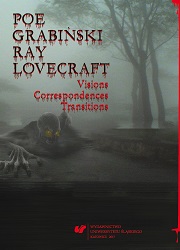La conception du métafantastique de Stefan Grabiński, à l’exemple de L’Ombre de Baphomet
La conception du métafantastique de Stefan Grabiński, à l’exemple de L’Ombre de Baphomet
Author(s): Katarzyna Gadomska
Subject(s): Language and Literature Studies, Literary Texts, Studies of Literature, Philology, Theory of Literature
Published by: Wydawnictwo Uniwersytetu Śląskiego
Keywords: fantastic literature; metafantastic literature; philosophy; universal mobility; polymorphic reality; primacy of thought over matter; devil
Summary/Abstract: The present article discusses the conception of metafantastic literature by Stefan Grabiński – a Polish writer called the Polish Poe or the Polish Lovecraft, at the example of Baphomet’s Shadow, the novel of 1926. The specificity of his fantastic literature is based on constant references to philosophy of Heraclitus of Ephesus, Plato, Georg Wilhelm Friedrich Hegel, Henri Bergson and William James, to name only a few. The study examines two of the most important ideas in Grabiński’s fantastic: the universal mobility and the polymorphic reality, as well as the primacy of thought over matter. Without the knowledge of these ideas, Grabiński’s fantastic becomes hermetic and incomprehensible.
Book: Poe, Grabiński, Ray, Lovecraft. Visions, Correspondences, Transitions
- Page Range: 119-132
- Page Count: 14
- Publication Year: 2017
- Language: French
- Content File-PDF

